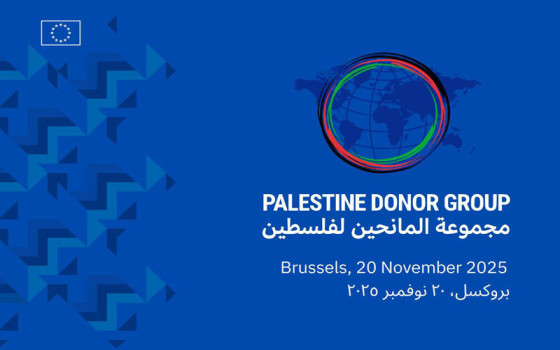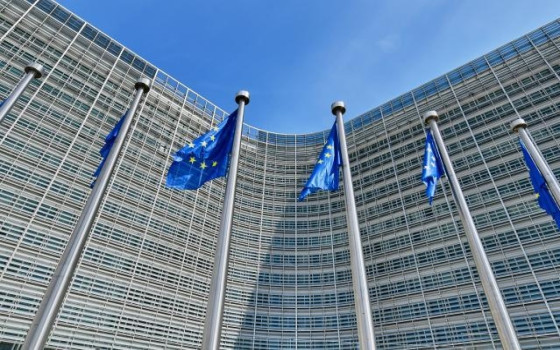Donors Group for Palestine: European Commission Announces Details of a Comprehensive Three-Year Program Worth €1.6 Billion Linked to a Reform Agenda Committed by the Palestinian Authority

- Europe and Arabs
- Friday , 21 November 2025 10:41 AM GMT
Brussels: Europe and the Arabs
During the first meeting of the donor group for Palestine in Brussels, co-chaired by the Commissioner for Mediterranean Affairs, Dubravka Šujka, and the Palestinian Prime Minister, Mohammad Mustafa. The European official stated in her address yesterday, “The European Union has always been, and remains, a strong partner of the Palestinian people, both politically and financially. Since 1994, we have provided nearly €30 billion in assistance.
This year, we adopted a comprehensive three-year program worth €1.6 billion.
Our financial support is linked to the Palestinian Authority’s reform agenda, which it has committed to implementing.
We see these reforms as a prerequisite for a viable two-state solution, which is our ultimate goal.
Today marked a significant moment: the inaugural meeting of the Donor Group for Palestine, a platform that brings together key international partners to support a reformed and effective Palestinian Authority.
Our objective is to strengthen governance, build a more resilient economy, stabilize the fiscal situation, improve services for the population, and create the conditions for effective governance in the future across all Palestinian territories.
The recovery of Gaza was also a key part of our discussions.
The European Union firmly believes that Palestinians must have a real and decisive role in shaping their future, including governance throughout the West Bank and East Jerusalem.” And Gaza.
The donor group aims to support and monitor the implementation of the reform agenda, ensuring accountability and progress.
The meeting was a success, bringing together more than 60 delegations from around the world, demonstrating solidarity and tangible support.
By joining forces, we have demonstrated the essential role of collective action in addressing the complex challenges facing the Palestinian Authority.
Our message was clear: Your Excellency, Prime Minister, you are not alone in this endeavor.
We recognize the progress made on key reforms under exceptional circumstances.
We support your commitment to the reform agenda, particularly fiscal, economic, and governance reforms.
Social protection and education reforms remain crucial. Much more work needs to be done in these areas.
It is essential that we remain firmly committed to this path with determination and complete transparency.
In cooperation with Member States, the EU also supports anti-corruption measures, as well as private sector development and the provision of essential services in the energy, water, and digitalization sectors.
I would like to discuss how the EU provides its support.
We provide our financial contributions to the Palestinian Authority through the PEGASE mechanism [for support]. Essential expenditures, including public sector salaries, such as those of teachers and healthcare workers, and civil servant pensions.
PEGASE is a secure, reliable, and proven instrument, backed by rigorous monitoring and verification mechanisms and robust safeguards.
Today, we had an important opportunity to showcase and support this system.
I am pleased to announce that today, in cooperation with Germany, Luxembourg, Slovenia, and Spain, we signed new contribution agreements totaling over €82 million, representing additional financial support from our Member States through PEGASE. The total amount pledged this year exceeds €88 million, including previous contributions from Finland, Ireland, Italy, and Spain.
This mechanism remains open to all partners wishing to join.
As mentioned, the EU's support is substantial, but we need further international support to stabilize the Palestinian financial situation.
I commend the recent emergency support initiatives and additional contributions from Member States, and I reiterate our call for all donors to intensify their efforts. Israel, of course, has an important role to play in This. And I believe they also want to reform the Palestinian Authority.
We will continue to engage with them and urge them to release the tax revenues, along with renewing the corresponding banking relationships.
Let's now turn to Gaza. Any credible future recovery and reconstruction efforts must be Palestinian-led.
The ceasefire is holding, but it remains fragile, and urgent humanitarian access to those in need is still required.
We welcome the US-led UN Security Council resolution on the Gaza peace plan as a key step forward in advancing peace.
The resolution also refers to the need to reform the Palestinian Authority, and the donor group for Palestine is contributing to this goal.
I reiterate that our broader objective remains the two-state solution.
In cooperation with the efforts led by the United States, Egypt, Qatar, Turkey, and the wider international community, we can turn this vision into a lasting reality.
The European Union is also ready to participate in the next phase—on further reforms, humanitarian assistance, and recovery—as part of Team Europe, alongside our Member States and our key regional and international partners.
Our efforts are focused on ensuring full respect for international law in My recovery and reconstruction efforts must include Palestinian participation in governance throughout the Palestinian territories.
In these challenging times, we must keep hope alive. The vision of peace and security in the Middle East remains essential.
Today, we have demonstrated that this commitment remains strong.
Let us continue to join forces for a better future. Peace in the Middle East is a real opportunity for Israelis and Palestinians to live side by side in peace and security.
The European Commission convened the first meeting of the Palestine Donors Group in Brussels, co-chaired by Commissioner for the Mediterranean, Dubravka Šujka, and Palestinian Prime Minister Mohammad Mustafa.
This meeting is a direct result of the EU's Comprehensive Multi-Year Programme for Palestinian Recovery and Resilience, adopted in April, and reflects the EU's commitment to the stability of the region, as reaffirmed by President Ursula von der Leyen in her State of the Union address in September 2025.
The donor group for Palestine brought together ministers and senior officials from some 60 key international and regional actors. These included EU member states, Arab states, potential donors to the Gaza peace plan, as well as international and regional organizations and financial institutions. Participants discussed the Palestinian Authority’s financial situation, as well as the status of its reform agenda linked to the EU’s comprehensive multi-year program of support to Palestine, valued at up to €1.6 billion. They also exchanged views on economic recovery in the West Bank.
The Palestinian-European Reform Matrix, as agreed with the Palestinian Authority in November 2024, is based on the Palestinian Authority’s ambitious reform agenda. Today’s meeting was primarily an opportunity to assess progress in this regard and to secure political support from international partners for this ambitious reform plan.
In this context, the Palestinian Authority presented its progress to date in fiscal, economic, and administrative reforms. It also outlined achievements in the provision of basic services, including education, health, and private sector development. Second, the Development Policy Group also discussed the latest developments and initiatives concerning the future of Gaza, following the adoption of UN Security Council Resolution 2803 on Gaza on 17 November 2025.
The Commission will continue to support all efforts aimed at achieving stability in the region, including transitional governance, recovery, and reconstruction in the West Bank and Gaza, with the reform agenda at the heart of its work.














No Comments Found